Related Research Articles

Lotfi Aliasker Zadeh was a mathematician, computer scientist, electrical engineer, artificial intelligence researcher, and professor of computer science at the University of California, Berkeley. Zadeh is best known for proposing fuzzy mathematics, consisting of several fuzzy-related concepts: fuzzy sets, fuzzy logic, fuzzy algorithms, fuzzy semantics, fuzzy languages, fuzzy control, fuzzy systems, fuzzy probabilities, fuzzy events, and fuzzy information. Zadeh was a founding member of the Eurasian Academy.

Hendrik Pieter (Henk) Barendregt is a Dutch logician, known for his work in lambda calculus and type theory.

Joseph Amadee Goguen was an American computer scientist. He was professor of Computer Science at the University of California and University of Oxford, and held research positions at IBM and SRI International.

Gerard J. Holzmann is a Dutch-American computer scientist and researcher at Bell Labs and NASA, best known as the developer of the SPIN model checker.
King-Sun Fu was a Chinese-born American computer scientist. He was a Goss Distinguished Professor at Purdue University School of Electrical and Computer Engineering in West Lafayette, Indiana. He was instrumental in the founding of International Association for Pattern Recognition (IAPR), served as its first president, and is widely recognized for his extensive and pioneering contributions to the field of pattern recognition and machine intelligence. In honor of the memory of Professor King-Sun Fu, IAPR gives the biennial King-Sun Fu Prize to a living person in the recognition of an outstanding technical contribution to the field of pattern recognition. The first King-Sun Fu Prize was presented in 1988, to Azriel Rosenfeld.
John Yen is Professor of Data Science and Professor-in-Charge of Data Science in the College of Information Sciences and Technology at Pennsylvania State University. He currently leads the Laboratory of AI for Cyber Security at Penn State. He was the founder and a former Director of the Cancer Informatics Initiative there.
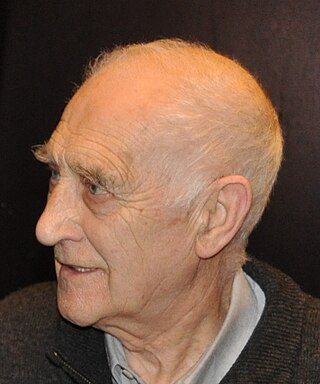
Willem Louis van der Poel is a Dutch computer scientist, who is known for designing one of the first computers to be designed in the Netherlands, the Zeer Eenvoudige Binaire Reken Automaat (ZEBRA), translated as Very Simple Binary Automatic Calculator.

George Jiří Klir was a Czech-American computer scientist and professor of systems sciences at Binghamton University in Binghamton, New York.
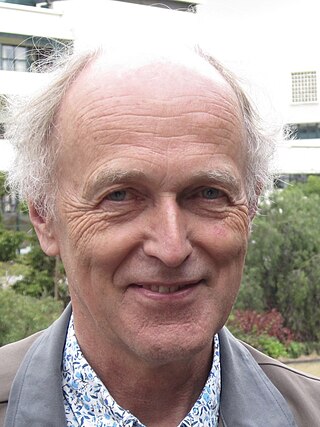
Jean Leonardus Gerardus (Jan) Dietz is a Dutch Information Systems researcher, Professor Emeritus of Information Systems Design at the Delft University of Technology, known for the development of the Design & Engineering Methodology for Organisations. and his work on Enterprise Engineering.

Paul Michael Béla Vitányi is a Dutch computer scientist, Professor of Computer Science at the University of Amsterdam and researcher at the Dutch Centrum Wiskunde & Informatica.
Dorothea Jacqueline (Dorien) DeTombe is a Dutch sociologist and former academic at the Utrecht University and the Delft University of Technology, known for her contributions in the field of methodology for societal complexity.

Adolf Alexander Verrijn Stuart was a Dutch computer scientist, and the first Professor in computer science at the Leiden University from 1969 tot 1991.

Gideon Jan (Don) Mellenbergh was a Dutch psychologist, who was Professor of Psychological methods at the University of Amsterdam, known for his contribution in the field of psychometrics, and Social Research Methodology.
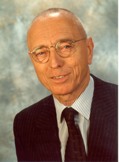
Adrianus Teunis (Aad) de Hoop is a Dutch electrical engineer, mathematician, and physicist, and professor emeritus at Delft University of Technology. De Hoop's research interests are in the broad area of wavefield modeling in acoustics, electromagnetics, and elastodynamics. Other research includes a method for computing pulsed electromagnetic fields in strongly heterogeneous media with applications to integrated circuits, and a methodology for time-domain pulsed-field antenna analysis, design, and optimization for mobile communication and radar applications.
Jacobus (Jaap) Wessels was a Dutch mathematician and Professor of Stochastic Operations Research at the Eindhoven University of Technology, known for his contributions in the field of Markov decision processes.
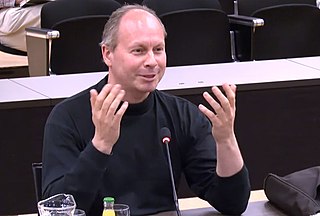
Christopher (Chris) Verhoef is a Dutch computer scientist, and Professor of Computer Science at the Vrije Universiteit in Amsterdam.
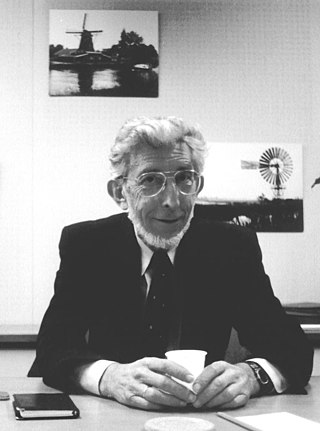
Jan in 't Veld was a Dutch aerospace engineer and professor of industrial organization at the Mechanical Engineering Department of the Technical University of Delft. In the Netherlands he was one of the pioneers of the application of systems theory in business administration and management.
Walter Julius Michael Kickert is a Dutch academic, and Professor of Public Management at the department of Public Administration, Erasmus University Rotterdam, known for his work on "Public policy and administration sciences in the Netherlands."
Cornelis Johannes (Cor) van Dijkum is a Dutch sociologist, consultant and academic at the Utrecht University, known for his contributions in the field of methodology for complex societal problems.
References
- ↑ Henk Koppelaar stelt zich aan u voor at gkv.nl. Accessed 11-02-2021.
- 1 2 Henk Koppelaar, at chessprogramming.org. Accessed 11-02-2021.
- ↑ Suen, Ching Y., Marc Berthod, and Shunji Mori. "Automatic recognition of handprinted characters—the state of the art." Proceedings of the IEEE 68.4 (1980): 469-487.
- ↑ Smith, Andrew. "Three scenarios for applying chaos theory in consumer research." Journal of Marketing Management 18.5-6 (2002): 517-531.
- ↑ Henk Koppelaar at dbnl.uni-trier.de.